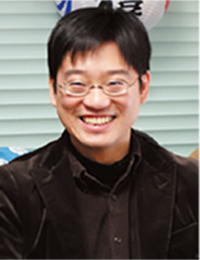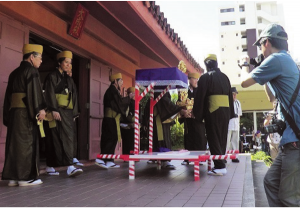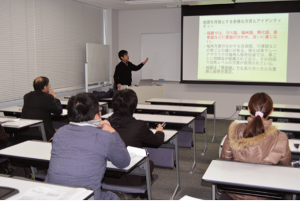キーワード: 秩序、災厄、記憶、知識、共同体
 人類は、自然・人為双方の災厄による秩序の喪失と再生を連綿と繰り返してきました。絶え間なく続く災厄のなか、人類はいかにして秩序を保ち、また、いかにして秩序を取り戻してきたのでしょうか。秩序に対して人々の記憶と知識が果した役割について、民俗学、文化人類学、考古学、東洋史、西洋史、日本史と多岐にわたる研究者が協力し、各々の研究方法から考察を進めているのが、リサーチユニット「人類史上の秩序における記憶と知識」です。
人類は、自然・人為双方の災厄による秩序の喪失と再生を連綿と繰り返してきました。絶え間なく続く災厄のなか、人類はいかにして秩序を保ち、また、いかにして秩序を取り戻してきたのでしょうか。秩序に対して人々の記憶と知識が果した役割について、民俗学、文化人類学、考古学、東洋史、西洋史、日本史と多岐にわたる研究者が協力し、各々の研究方法から考察を進めているのが、リサーチユニット「人類史上の秩序における記憶と知識」です。
受け継がれる行動の記憶から人類史を紡ぐ

図1:那覇市の孔子廟の「遷座式」調査風景。戦災による壊滅後の移転先から元の住所へ(2013 年)
私たちは、秩序・知識・記憶の研究に当たって、歴史上の災厄をいくつもの視点から捉えています。たとえば、人為的な災厄である戦争について、沖縄の戦争記憶と戦後(図1)、中国台湾における近代国家の建設、イギリス帝国における世界大戦の戦没者追悼などを個別の出来事として切り離さずに、複眼的に捉えなおしています。沖縄本島では祖先祭祀において元祖との系譜関係が重要ですが、地上戦で戦前の文字記録(系図・家譜など)の多くが焼失してしまいました。しかし、戦後も生き残った人たちが墓・位牌への祭祀を続けたことで祖先以来の人間関係は今日までつながっています。このように歴史が今日まで連続し関連していることに気付くことが大切です。
歴史の記憶を現在の実践へ
また、平時の苦難の記憶化にも視野を広げ、19世紀前半の中国における経済的な構造変化と秩序、環東シナ海(日本・韓国)の資源・観光開発や国家と交渉する民俗世界、北海道・カナダ西部の開拓といった、文化圏の境界における秩序の動態についても研究を進めています。破壊と創造、および長期的な記憶の伝承についての議論を俎上に載せ、構成員が各自の研究分野からアプローチすることで、広く人類史的な知識体系から現代社会に対する提起を目指しています。また、研究から明らかになった繋がりを現在の人々に返す、「歴史の実践」にも力を入れていきたいと考えています。

図2:公開講座『変革期の社会と人間―「破壊」と「再生」の歴史・人類学―」の開催風景
社会への貢献・実績
● 平成25年度筑波大学大学院人文社会科学研究科公開講座(図2)
『 変革期の社会と人間 ―「破壊」 と「再生」の歴史・人類学― 』
( 2014年1月11日・2月8日・22日 場所:筑波大学東京キャンパス文教校舎)
Passing down long-term memories of destruction and creation in human history
Unit members : Yamamoto, Shin YAMASAWA, Manabu Shibata, Daisuke Nakano, Yasushi Tsuda, Hiroshi
Unit name: Role of memory and knowledge in the construction of “order” in history of humankind
Key words: order, disasters, memories, knowledge, communities
 Throughout human history, the loss of order due to both natural and man-made disasters and its restoration have been repeated. How have humans been able to maintain or restore order during a period of time when experiencing a significant number of disasters? The research unit: “Role of Memory and Knowledge in the Construction of “Order” in History of Humankind” consists of researchers specializing in folklore, anthropology, archeology, and Oriental, Western, and Japanese histories, and they collaborate with each other to discuss what roles are fulfilled by people’s memories and knowledge to maintain or restore order, based on many different research methods.
Throughout human history, the loss of order due to both natural and man-made disasters and its restoration have been repeated. How have humans been able to maintain or restore order during a period of time when experiencing a significant number of disasters? The research unit: “Role of Memory and Knowledge in the Construction of “Order” in History of Humankind” consists of researchers specializing in folklore, anthropology, archeology, and Oriental, Western, and Japanese histories, and they collaborate with each other to discuss what roles are fulfilled by people’s memories and knowledge to maintain or restore order, based on many different research methods.
Behavioral memories inherited to review human history

Figure 1: A survey of a “Senza (relocation) ceremony” held in Confucius’s Mausoleum in Naha City. This Mausoleum that had been moved to another place due to war damage was transferred back to the original site (2013)
We conduct research on order, knowledge, and memories by reviewing disasters in the past from many different perspectives. For example, we review wars or man-made disasters, including memories of the wars fought on the islands of Okinawa and the postwar period on the islands (Figure 1), the establishment of China and Taiwan as modern states, and memorial services for people who died in the world wars conducted by the British Empire, from multiple points of view, rather than discussing them as different and separate events. Although an emphasis is placed on ancestral lineages, or family trees, in ancestral rituals held on the main island of Okinawa, most of the documents written prior to World War II were burned in fires during ground battles. However, owing to survivors of the war who continued to hold ancestral rituals involving graves and spirit tablets, documents that state ancestral lineages have been passed down to date. It is important to be aware that the history of humans both leads to and is associated with modern times.
Historical memories for implementation in current society
From the viewpoint of memorizing hardships experienced in times of peace, we also conduct research on the dynamics of order on the borders between different cultural areas, including those related to changes and order in the economic structure of China in the first half of the 19th century, the development of resources and tourism by countries located along the East China Sea (Japan and South Korea)/ethnic groups that negotiate with these countries, and cultivation in Hokkaido and Western Canada. Members of the unit discuss subjects, such as destruction and creation as well as the succession of long-term memories, using approaches adopted in specialized research fields, to raise questions to modern society based on a broad range of structured knowledge related to human history. The unit also discusses the associations and relationships among different areas and periods suggested by research results, and examines what roles they fulfill in modern society: “The implementation of history”.

Figure 2: A scene of the public lecture “Society and Humans during a Revolutionary Period – History of “Destruction” and “Regeneration” / Anthropology”
Social contributions and achievements
“Society and Humans during a Revolutionary Period – History of ‘Destruction’ and ‘Regeneration’ / Anthropology” (Figure 2): Public lecture held in 2013 by the Faculty of Humanities and Social Sciences, the University of Tsukuba Graduate School
(Date: January 11th/February 8th and 22th, Place: Bunkyo School Building on Tokyo Campus of the University of Tsukuba)
Interviewed on January 15, 2015
